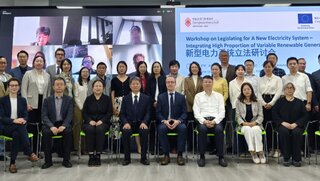Workshop on legislating for a new electricity system – integrating high share of variable renewable generation

On 11 October 2024, GIZ, China Electricity Council (CEC), and the EU-China Energy Cooperation Platform (ECECP) co-hosted a “Workshop on legislating for a new electricity system – integrating high share of variable renewable generation”. The workshop aimed at deepening exchanges and cooperation in advancing the legislative framework to drive energy transitions. As China works to revise its Electricity Law to support a renewable energy-dominated power system, the event provided a platform for policy makers and researchers from China, EU, Germany, Denmark, Netherlands, and France to exchange knowledge and share experiences. Over 80 participants from the National People's Congress, NDRC, Ministry of Justice, NEA, EU delegation, the German Embassy, Netherlands Embassy, Denmark Embassy, and Chinese power generation companies, grid companies and research institutions engaged in discussions on electricity market design, system stability challenges and legislative reforms to support renewable energy integration.
Energy laws and regulation advance energy transition
In the opening remarks of the event, Mr. Liang Zhipeng, Deputy Director General of the Law and Reform Department of the National Energy Administration (NEA), highlighted the need to revise China’s Electricity Law to accommodate the growing integration of renewable energy and distributed generation over the past 30 years. He also stressed the importance of exchanging experience with EU, Germany and otherEuropean countries during this process.
Mr. Zeno Reichenbecher, First Counsellor and Economic Affairs Coordinator at the German Embassy reassured the importance of strengthening the exchange and cooperation on electricity laws, regulations, market mechanisms and policies between China and Germany.
Dr. Wang Peng, Executive Dean of the National Institute of Energy Development Strategy at North China Electric Power University, provided an overview of China’s current Electricity Law and the objectives behind its revision. Dr. Rozeta Karova, consultant with UNOPS and World Bank, outlined the evolution of EU energy policy and legislation in the power sector. Experts from Germany, the Netherlands, Denmark, and France shared insights on the challenges and legislative, policy, market design, and regulatory adjustments made in their countries to better integrate renewable energy into their power systems.
In closing, participants from both sides expressed a strong commitment to deepening exchanges between China and Germany on energy sector legislation and electricity market development, further promoting green, low-carbon, and sustainable development.
Sino-German cooperation on energy legislation
Within the framework of the Sino-German Energy Partnership (EP), exchanges on legislation to advance the energy transition while ensuring energy security have been a key focus of the Sino-German Energy Working Group. This collaboration is driven by the German Federal Ministry for Economic Affairs and Climate Action (BMWK) and China's National Energy Administration (NEA). To facilitate these exchanges, GIZ , in cooperation with the China Electricity Council (CEC), has successfully organized two Sino- German workshops on the energy legislation and policy in 2022 and 2023. These workshops provided a platform for knowledge sharing on the legislative frameworks required to support the transition to a low-carbon energy system. In 2023, GIZ published a report The Role of Energy Law in German Energy Transition, which provides an in-depth insight of Germany's energy law system and its pivotal role in shaping the country's energy transition.
Download the event materials (selected)
- 01 Status and Revision of Chinas Electricity Law (836 KB, PDF)
- 02_EU Regulations on Electricity Market CN (3 MB, PDF)
- 03_Adjustments in law for a decarbonised electricity system (779 KB, PDF)
- 04_Electricity market reforms and integration of renewable energy in Denmark (2 MB, PDF)
- 05_Congestion and instruments to incentivize local exchanges in electricity_Netherland (526 KB, PDF)